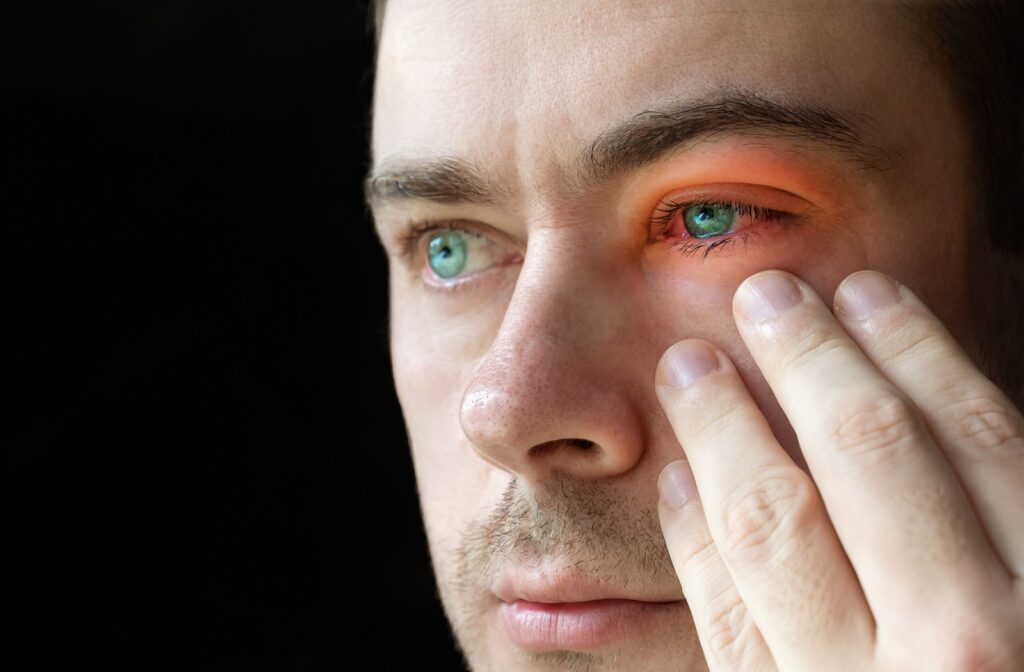Blepharitis is a frequently discussed eye condition due to its pesky symptoms and noticeable impact on daily life. If you’ve experienced red, swollen, or itchy eyelids or heard about blepharitis from a friend or family member, you may have wondered, “Is blepharitis contagious?” The short answer is, no, blepharitis is not contagious.
The team at Bluebird Vision + Wellness has put together a detailed yet easy-to-understand guide on blepharitis, its causes, and treatment options–starting with an eye exam! Here’s everything you need to know.
What is Blepharitis?
First things first, blepharitis simply means inflammation of the eyelids. It’s a relatively common eye condition, affecting people of all ages. This inflammation targets the edges of the eyelids where the eyelashes grow. While it isn’t life-threatening, it can be quite bothersome and lead to chronic irritation if not treated properly.
Symptoms of Blepharitis
Blepharitis can manifest in a variety of symptoms, and while it’s not overtly harmful, the level of irritation it causes can make day-to-day activities uncomfortable. Common symptoms include:
- Red and swollen eyelids
- Flaky or dandruff-like debris near the base of the eyelashes
- Burning or stinging eyes
- Excessive tearing or watery eyes
- Sensitivity to light
- A gritty sensation, as if something is stuck in your eye
- Loss of eyelashes or misplaced growth patterns (in severe cases)
Symptoms can occur in either one or both eyes, and they often come and go. Left untreated, blepharitis can escalate, potentially leading to other issues like dry eye syndrome, keratopathy styes, or even eyelid scarring.
What Causes Blepharitis?
Blepharitis isn’t caused by a single factor. Instead, it can result from a combination of various underlying issues. Some of the most common causes include:
- Bacterial infections: Overgrowth of bacteria on the eyelids can lead to inflammation.
- Blocked oil glands: Tiny oil glands at the base of the eyelashes can become clogged, triggering irritation.
- Skin conditions: Issues like dandruff or rosacea can contribute to blepharitis.
- Allergies: Environmental allergens, as well as reactions to eye makeup or skincare products, may play a role.
- Demodex mites: These microscopic mites naturally exist on our skin but can sometimes cause trouble when they infest the base of the eyelashes.
Blepharitis is further classified into two main types based on where the inflammation occurs:
- Anterior Blepharitis: This affects the outer edge of the eyelids where eyelashes grow.
- Posterior Blepharitis: This occurs on the inner edge of the eyelids, near the area that touches your eye.
Both forms of blepharitis can be long-lasting or recurring, making it essential to identify and address the root cause to manage symptoms effectively.
Is Blepharitis Contagious?
The short answer is no—blepharitis is not contagious. You cannot “catch” blepharitis from someone else, even if they have visible symptoms such as crusting or redness on their eyelids. This is because blepharitis is typically caused by internal issues, like blocked oil glands or skin conditions, rather than viral or bacterial transmission between individuals.
However, it’s worth noting that some underlying factors associated with blepharitis, such as bacterial infections or Demodex mites, can spread under certain circumstances. For instance, sharing unclean makeup tools, towels, or pillowcases could potentially transfer bacteria or mites that worsen or trigger symptoms. This is not the same as the condition itself being contagious, but proper hygiene helps reduce the risk of such issues.

Treatment Options for Blepharitis
Although blepharitis is a chronic condition that may not have a complete cure, its symptoms and recurrences can be managed effectively with the right approach. Common treatment options include:
- Daily Eyelid Hygiene: Regular cleaning of your eyelid margins using warm compresses and a gentle cleansing solution can help remove debris and reduce inflammation. This step is key to preventing clogged oil glands.
- Medications: For bacterial infections, your eye care provider may prescribe topical or oral antibiotics. If inflammation persists, steroid eye drops or ointments may be recommended.
- Professional Treatments: Clinics like Bluebird Vision + Wellness specialize in treatments for dry eyes and other related conditions, which may help alleviate blepharitis symptoms. Procedures that focus on unclogging the oil glands, like Thermal Pulsation Therapy, are becoming increasingly popular.
- Managing Underlying Conditions: Addressing skin conditions like rosacea or dandruff can play a major role in controlling blepharitis over time.
- Avoiding Triggers: If your blepharitis is exacerbated by allergies, use hypoallergenic eye makeup or skincare products and try to minimize contact with known irritants.
Your eye doctor will tailor treatment to your symptoms and the specific cause of your blepharitis, so consulting a specialist is crucial.
Preventive Measures to Reduce Your Risk
Blepharitis may not be fully preventable, but adopting healthy habits can significantly reduce the likelihood of flare-ups. Here are some tips:
- Stick to a Lid Hygiene Routine: Even if your symptoms subside, regular cleansing of your eyelid margins can prevent them from returning.
- Replace Makeup Frequently: Replace mascara, eyeliner, and other products every 3-6 months and avoid sharing them with others.
- Use Clean Bedding: Wash pillowcases and towels regularly to avoid the buildup of bacteria or mites.
- Take Breaks from Screen Time: Excessive screen use may contribute to dry eye symptoms, which can worsen blepharitis. Make sure to rest your eyes periodically.
- Visit Your Eye Doctor Regularly: Routine eye exams can help identify early signs of blepharitis or associated conditions like dry eye syndrome before they worsen.
At Bluebird Vision + Wellness, we specialize in providing comprehensive care for eye conditions like blepharitis. Whether you need advice on treatment options or professional care, our team is committed to helping you understand and manage your eye health.
Blepharitis: Manageable, Non-Contagious, and Worth Taking Control Of
While blepharitis can be frustrating, especially for those dealing with chronic symptoms, the good news is that it’s a manageable condition and not contagious. By understanding what causes blepharitis and adopting preventive measures, you can take control of your eye health. If you suspect you’re experiencing symptoms of blepharitis or need personalized care, don’t hesitate to contact a trusted eye professional.
Your eyes deserve the best care. Reach out to our team at Bluebird Vision + Wellness to book an appointment today. Together, we’ll work on a plan to keep your eyes healthy, comfortable, and crystal clear.




